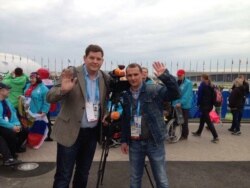When Russian police arrested renowned investigative reporter Ivan Golunov on drug charges last June, the reaction came swiftly.
Global media freedom groups joined colleagues in Russia in a campaign to defend Golunov. Protests erupted in Moscow, famous journalists and celebrities rallied on social media, and after several days of pressure, Golunov was released. Finally last week, authorities charged five ex-police officers with planting drugs on Golunov to frame him.
Press advocates and friends cheered. Golunov was known for his muckraking investigations into local corruption and organized crime. Their slogan, “We are/I am Ivan Golunov,” had won the day.
If only it had been that quick for me.
In 2013, I was an investigative reporter who’d spent more than 15 years covering southern Russia for national TV channels. During my final three years, I produced reports from Sochi ahead of the 2014 Olympic Games. It was a time of rampant corruption involving Olympic construction, and the games were President Vladimir Putin’s pet project.
Local citizens lost their own houses without compensation – broken promises from the government. Environmental destruction meant nothing in front of bulldozers. Corruption and bribery infested the city, with many close to the authorities trying to cash in.
I reported that several families had lost their apartments in Kudespsta because Olympic developers grabbed the land. The TV station I’d worked at for more than eight years fired me. I then reported for CNN, the Boston Globe and ZDF, the German public broadcaster. Because my reporting had an international audience I became a Kremlin target.
*****
With every story, threats came in.
One case I investigated involved a secret police informant. This person kidnapped a young girl from a well-off Sochi family after her mother died. He was granted custody rights in a corrupt court case, then moved the girl to Georgia. It was all a scam to get the girl’s inherited property – farmland and a downtown apartment in Sochi.
The local prosecutor claimed nobody knew where the girl was, even though he’d sent an official letter confirming that police previously had a Skype conversation with her. I recorded interviews with the deputy mayor of Sochi and the head of the child welfare department. In the end, I concluded there was a corruption chain motivated by money.
We obtained an interview appointment with the prosecutor. I was headed there on May 23, 2013, with my cameraperson, Phillipp Vaselenko, when five high-ranking traffic police stopped my car and began searching it. After rummaging around the back seat, they produced a packet of narcotics and led me off for arrest.
It wasn’t mine. I had heard stories about police planting drugs but never thought it could happen to me. I was naive.
My lawyers were sure that I would be found guilty under pressure from the Putin regime. Everyone seemed to understand that it was a fabricated case. That is just how it works.
Luckily, though, international human rights groups were focused on the Olympics. As with Golunov, they collaborated with local journalists – my friends – to defend me. Their intensive coverage of my case surprised and intimidated the prosecution.
I was charged with drug possession but never convicted. The police investigators were unable to prove that the drugs belonged to me. Still, a judge had decided to put me under home arrest. And month after month, police got the court to extend my confinement.
For 10 months, I was stuck in a rented apartment without any opportunity to make money. The court forbade me to use the internet or give any interviews. That was the most horrible time in my life, and I sometimes thought about suicide.
The lead investigator did not even try to hide that my case was fabricated. She was convinced I would go to prison for 10 years. I had witnessed numerous criminal procedure violations. My lawyers documented these and sent complaints, but it didn’t help at all.
Interrogators threatened to disembowel Philipp and confiscate business properties he owned unless he testified against me. He refused.
Then, as the Olympic Games neared, word came that my case was dropped. Investigators apparently didn’t want to explain how the drugs got in my car, or why I was stopped. They just wanted me to shut up.
But I couldn’t. Instead, I ignored their instructions and gave interviews to journalists and told them everything that happened. After the Olympics closed, Philipp and I were in Moscow in March 2014 to meet with human rights lawyers. During the meeting, my lawyer in Sochi called to say my case had been reopened. I’d be arrested if I came back.
That was it – Philipp and I decided we had to leave Russia.
*****
As the Golunov case unfolded, I thought back to those times and wondered.
What about the thousands of cases brought against Russians – government critics, artists, human rights activists – who don’t have the support network that journalists do, or the opportunity to leave Russia, even temporarily?
Unfortunately, we can’t count how many innocent people are in jails only because they had a good business that attracted corrupt officials or police who wanted a cut.
That former officers are being held accountable in the Golunov case appears to be a hopeful moment, and it is.
But we should be under no illusions. The Kremlin has many ways to shatter hope.
Editor’s Note: Nik Yarst is the visuals editor for Polygraph.info, a Voice of America fact-checking site. He and his cameraperson Philipp Vaselenko were granted asylum in August 2017. Both are now permanent residents of the United States.






